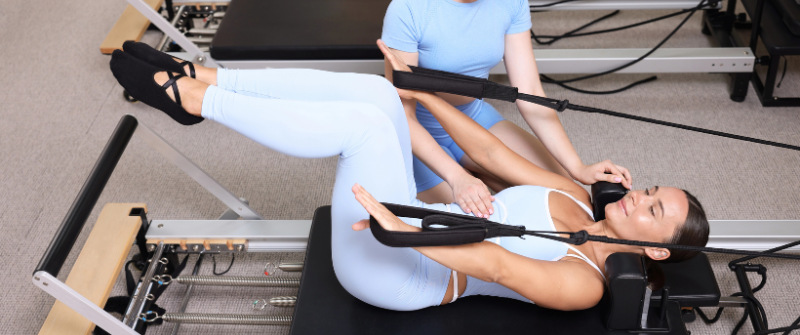
- by NEXO Team
- February 2, 2023
Now that you've had the opportunity to become a fitness trainer and gain experience managing clients, you might feel like it’s time to set your sights on opening a gym. No matter the amount of time you've been a trainer, it's necessary to assess your circumstances and goals so you know the time is ripe for a fitness business. It takes more than a dream.
Before you toss your hat into the ring, take a hard look at yourself to determine if you have what it takes to own and operate a fitness center. Start by asking yourself the following questions:
- Do you want to start with an already established gym or start one from the ground up?
- Why do you want to start a gym business?
- Do I have skills or knowledge to be a successful fitness business entrepreneur?
- Are you going to do it alone or with a business partner?
- Are you willing to network with members and professionals in the fitness sphere?
- How much will it cost?
- How much space do I need?
- What kind of gym insurance do I need?
- How do you plan to fund your business?
- What is your business model?
- What services, amenities and niches will your fitness center provide?
- What kind of professionals do I need to hire?
- What kind of equipment do I need?
- What are my revenue goals?
- What are my monthly and annual operational costs?
Write down the answers to these questions and use them to build your mission statement and business plan. Research if necessary to ensure you are not overlooking matters that can make or break your gym business later on down the road. Then consider the following information about opening a gym.
Motivation, Skills, and Development
No matter what your personal goals are, avoid assumptions and maintain realistic expectations. Good business sense is required. You could be the greatest trainer in the world, but without the right business knowledge or credentials, you might find yourself fighting an uphill battle as a business owner.
Organization is key, so is having the patience and a driven attitude to push beyond your comfort zone even in light of potential setbacks to reach your business goals. Take time to carefully plan your steps so you can pace yourself appropriately while achieving your short- and long-term goals when opening a gym.
Marketing and Advertising
Marketing and advertising a gym business involves promoting the services and facilities offered by the gym in order to attract new members and retain current ones. Here are some strategies that can be used to market and advertise a gym business:
- Utilize social media platforms such as Facebook, Instagram, and Twitter to reach a large audience and promote the gym's services. Share engaging content, such as workout tips and success stories from members, to build a strong online presence.
- Send regular newsletters and promotional emails to current and potential members to keep them informed about new classes, special offers, and events at the gym.
- Offer incentives to current members who refer friends and family to join the gym. This can be a great way to attract new members and retain existing ones.
- Host or participate in community events such as charities and health fairs to raise awareness about the gym and attract new members.
- Place ads in local newspapers, magazines, and on local radio and TV stations to increase visibility and attract new members.
- List your gym on online directories such as Google My Business to make it easier for potential members to find you.
- Offer discounts for new members, students, and senior citizens, and offer package deals to retain members.
- Partner with local businesses such as nutrition stores, health food stores and sports equipment shops to reach new audiences and offer package deals.
- A strong website can help establish your gym as a reputable and professional business. Include information about the gym's services, class schedules, and pricing, as well as testimonials from satisfied members.
- Offer personal training services and promote them through social media, newsletters, and events, to attract members who are looking for more personalized attention.
Financial Savviness
Good financial acumen is necessary, especially when you consider the daily, monthly annual and fixed costs of having a business. It helps to have some startup money set aside to help you get by as you build up your gym’s clientele. Develop good saving and accounting skills so you’ll have what you need to invest into your business with overflow available for the unexpected.
Sacrifice is also necessary when opening a gym business. Instead of financially rewarding yourself when your gym turns a profit or gains new members, reinvest some of it back into the gym. Innovation is a critical part of longevity in the fitness industry. Innovative gym owners continuously reinvest a portion of their revenue into their businesses for growth, longevity, and success.
Opening a gym is not a pipe dream, therefore you shouldn't approach it as one. Get rid of the barriers in your mind because there’s limitless potential for growth and sustainability when owning a gym. But to achieve them, you must be willing to invest much of your time as well.
As a trainer, you may have enjoyed the freedom and convenience of planning your schedule and having free time whenever you liked. However, opening and managing a gym requires you to give up some of your personal time to adjust to meeting the needs of your business and its clients.
Much of what you learn will be acquired outside of your gym’s operational hours. There’s nothing wrong with using some of your personal time to structure, plan, market, and manage your fitness business until it becomes a popular staple in the local community. This might require you to forgo hanging out with friends, sleeping in late, going on vacations, and splurging on items for yourself for the first few years. But, doing so allows you to reap the benefits and have more personal freedom to focus on your business as you please in the future.
Gym Facility: Lease or Buy
When it comes to securing property for a gym business, you’ll need to weigh the pros and cons of leasing or buying. Leasing is cheaper upfront because the payments are smaller and more affordable for many entrepreneurs just starting out in the industry. However, lease payments are not cheaper in the long run, especially for gym owners who plan to stay in the same location for several years or longer.
Research the different properties available and commercial real estate trends in prime locations and see how they measure up against your business plans, finances, and goals. As a new gym business owner, there’s no need to rent the biggest space available because it takes time to work out the kinks in your business plans to build up a solid clientele.
Staff and Trainers
When hiring gym staff and trainers, it is important to ensure that they have the necessary passion, attitude, qualifications and certifications and experience. Before hiring, conduct interviews, and reference and background checks. Also evaluate candidates’ fitness and training knowledge, and their ability to instruct and motivate others. Don't forget to look at salary, insurance, benefits, and training costs. It’s also crucial to have clear performance expectations for staff and trainers to ensure they always represent the gym missions in the best manner possible.
Financing Gym Equipment
Try not to get ahead of yourself as you contemplate buying or leasing equipment for your gym. Research to learn the average cost of gym equipment for your fitness niche. Make a list of items your members and staff need to pursue their fitness goals. Safety should come first, so safety mats, bars, sanitation supplies, etc. are non-negotiable. Measure the floor space and evaluate the layout before you add weight, training benches, dumbbells, treadmills, ropes, mirrors, and more.
If funding is an issue, you might want to consider leasing because it does not require you to put up any money upfront. For smaller payments, you can secure and upgrade equipment you need but it might have signs of wear and tear. Leasing gym equipment is a good option for those with limited space, funds, or clients. Leasing in some cases can help reduce repair and maintenance costs as well.
Gym Insurance
Gym business insurance protects gym owners and operators from financial losses due to accidents, injuries, and other unexpected events that may occur at the gym. Below are several types of gym insurance available for fitness business owners.
General Liability Insurance protects the gym from financial losses due to accidents or injuries that occur on the gym's property. It covers things like medical expenses, legal fees, and property damage caused by members.
Professional Liability Insurance covers the gym from financial losses due to trainer and gym staff mistakes, poor guidance and training, and negligence.
Property Insurance covers damaged or lost gym equipment, furniture, and facilities.
Workers' Compensation Insurance provides financial compensation for medical expenses and lost wages to staff who become injured on the job or while offering approved services off-site.
Event Insurance is for gym owners who host competitions, marathons, and community events. It provides coverage for losses due to cancelation, non-appearance of a key person, or other unforeseen circumstances.
Because gym insurance requirements vary greatly, it's important to consult with a qualified NEXO insurance agent to determine suitable coverage options for your business.
Key Takeaways
Taking the initiative to venture into the realm of gym proprietorship is commendable. With the right resources, opening a gym as a trainer is not an impossible task. Your ability to plan, organize, and manage finances, staff and more are crucial. Yet, the only way to know if you’re ready to open a gym is to take a hard look at yourself to determine whether you have the drive and motivation to navigate the industry. So, whenever you’re ready to get started, keep this guide in mind.
Contact NEXO for all your gym insurance needs at 310-937-2007.
Categories
Fill out a short form to contact us with your questions or to receive a customized quote.
Recent Posts
-
 Injury Waivers Aren’t Enough: Insurance Gaps Jiu-Jitsu Owners Overlook
January 21, 2026
Injury Waivers Aren’t Enough: Insurance Gaps Jiu-Jitsu Owners Overlook
January 21, 2026 -
 How Gym Risk Management Can Lead to Lower Premiums Over Time
January 21, 2026
How Gym Risk Management Can Lead to Lower Premiums Over Time
January 21, 2026 -
 Why Combat Sports Gyms Pay More for Insurance and How to Control Costs
January 21, 2026
Why Combat Sports Gyms Pay More for Insurance and How to Control Costs
January 21, 2026 -
 Functional Fitness Injury Trends That Impact Insurance Underwriting
January 21, 2026
Functional Fitness Injury Trends That Impact Insurance Underwriting
January 21, 2026 -
 Why Pilates Studios Face Unexpected Liability Despite Being Low-Impact
January 21, 2026
Why Pilates Studios Face Unexpected Liability Despite Being Low-Impact
January 21, 2026
